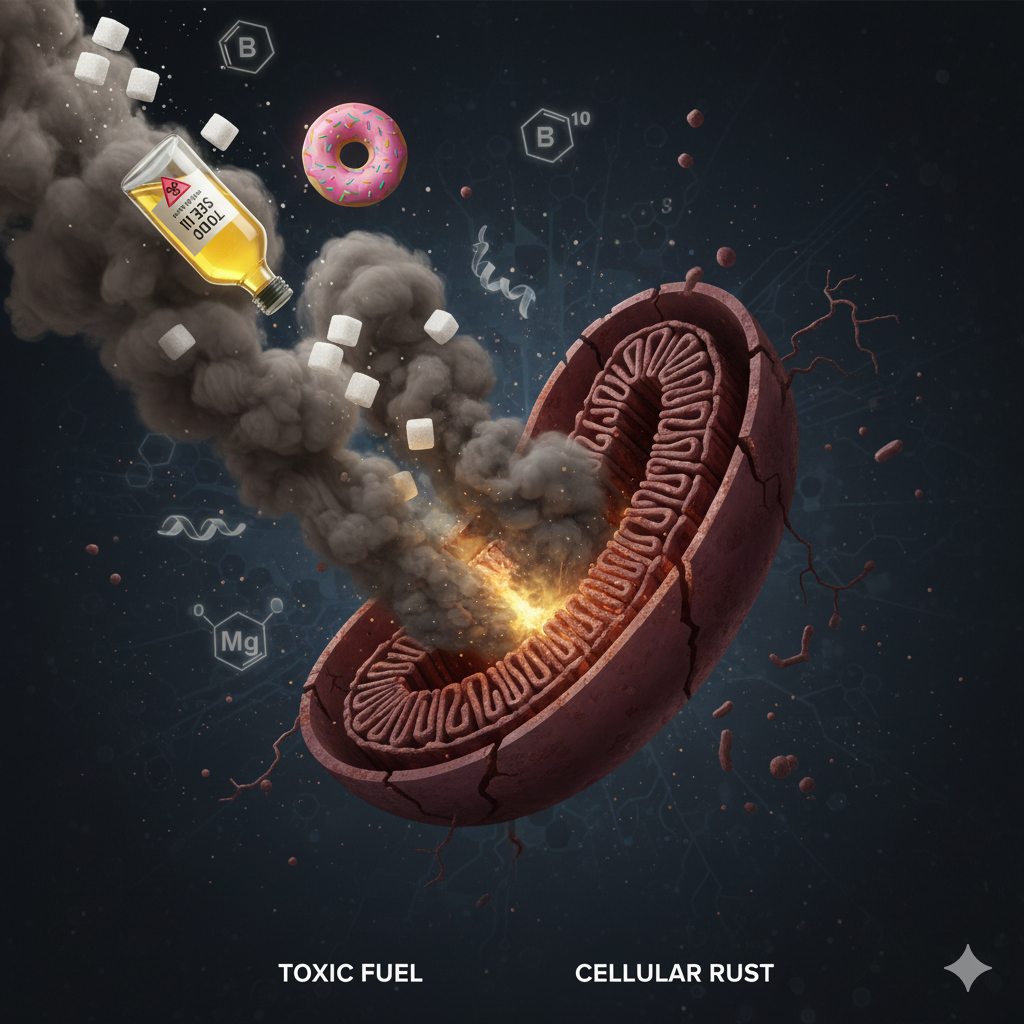Are You Sabotaging Your Cellular Engines? 13 Things That Damage Your Mitochondria
In Part 1, we learned that mitochondria are your cellular "power plants"—they create the energy that fuels your entire body and metabolism.
Lately, I've been obsessed with this topic, because if you have healthy mitochondria, you feel great. If you don't, you feel... well, not so great.
If you're feeling tired, foggy, inflamed, or like you just can't lose weight no matter what you do, your mitochondria might be taking a beating. Let's look at 13 of the most common things that quietly destroy them.
Group 1: Modern Lifestyle Habits

-
Bad Sleep: This is a big one. When you hit deep sleep, your cells go into repair mode. They detox, they fix damage. If you're skipping that deep sleep, you are literally short-circuiting this critical repair cycle.
-
Chronic Stress: When you're stressed, your body pumps out cortisol, which basically screams at your mitochondria, "GO! WE NEED ENERGY NOW!". That's fine for a short-term crisis, but if you're in that mode 24/7, you're redlining your engines all day, every day. It leads to burnout.
-
A Sedentary Lifestyle: Movement is a signal. It tells your body, "Hey, we need more energy here, build more power plants!". When you sit all day, that signal never fires. Your body gets lazy, and your overall energy capacity actually shrinks.
-
Overtraining: On the flip side, "more" is not always "better." Pushing high-intensity workouts day after day without rest creates more stress and damage than your body can repair. Rest is where the magic happens—it's when the repair and growth of new mitochondria actually occurs.
Group 2: The Food on Your Plate

-
Sugar Spikes: When you eat a donut or drink a sugary soda, your mitochondria get slammed with more fuel than they can possibly burn. It's like choking a fire with too much wood—you don't get a clean flame, you just get a lot of smoke. In your body, that "smoke" is inflammation and oxidative stress, which leads directly to insulin resistance.
-
Modern Seed Oils: (Like corn, soy, and canola oil). These are highly unstable omega-6 fatty acids. When you combine them with the high sugar we just talked about, it's like pouring accelerant on that smoky fire. It creates "cellular rust" that damages the mitochondrial membranes.
-
Low-Protein Diets: Your mitochondria need amino acids (from protein) to function and repair themselves. If you skimp on protein, your body will actually steal from your own muscle tissue to get the parts it needs.
-
Micronutrient Deficiencies: B Vitamins, Magnesium, and Coenzyme Q10 are the "spark plugs" for your mitochondrial engines. If you're deficient, your energy production stalls.
Group 3: Hidden Stressors (Meds & Toxins)

This part is fascinating. Even things we think are helping us can have a downstream effect.
-
Statins: These medications can block the body's pathway for making CoQ10—one of those critical "spark plugs" we just mentioned.
-
Metformin: Often used for blood sugar, it can also mildly inhibit the "start of the ATP assembly line".
-
Certain Antibiotics: Specifically a class called fluoroquinolones (like Cipro). They are designed to kill bacteria but can sometimes mess with our own mitochondrial DNA.
-
SSRIs: Some antidepressants can "jam up" the spinning complexes that generate energy, which may contribute to that "foggy" feeling some people report.
-
Environmental Toxins: Pesticides, plastics (BPA), and heavy metals are everywhere. They can block key enzymes and drain your body's main antioxidant, glutathione, leaving your mitochondria defenseless.
(A quick but important note: Please do not stop taking any prescribed medication based on this article. This is for informational purposes and to open a conversation with your doctor about your overall health.)
The Brooktree Solution: How to Fix It
Reading this, it's easy to feel overwhelmed. It seems like everything in modern life is working against us.
But the great news is that most of this damage is reversible.
The "fix" isn't one magic pill. It's about systematically removing these stressors and giving your body what it actually needs to repair and rebuild. It's about improving your sleep, managing your stress, moving correctly, and—most importantly—changing the fuel you put in your body.
This is the very core of what we do at Brooktree. We don't just look at calories or tell you to "exercise more." We take a comprehensive look at your entire lifestyle—your sleep, your stress, your nutrition, your environment—to identify what's really holding your health back at the cellular level.
If you're tired of feeling foggy, inflamed, and stuck, it might be time to stop guessing and start addressing the root cause.
Ready to power up your health? Schedule your complimentary discovery call with me today. Let's work together to create a plan to rebuild your energy and vitality from the ground up.






Responses